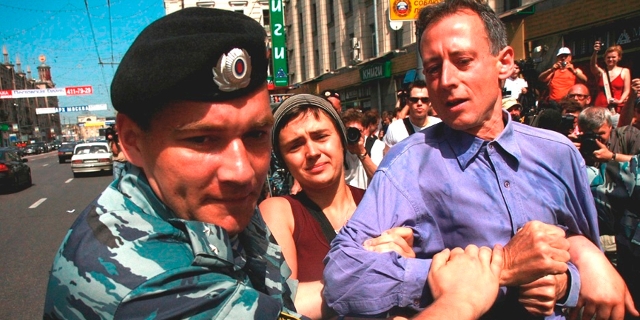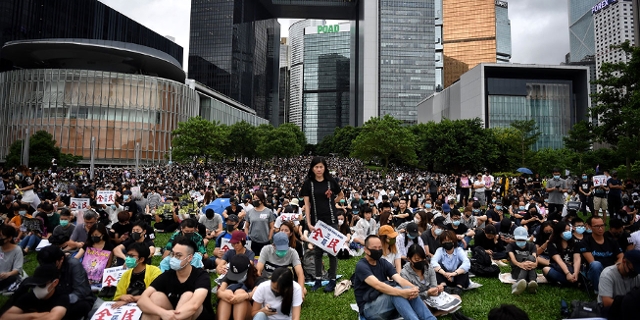Mia Bloom: Rape as a weapon of war is not inevitable
Conflict has probably been on many of our minds recently. And when war happens like in Ukraine or the Middle East, it’s often women and girls who end up suffering in the extreme.
When it comes to these conflicts, there have also been worrying headlines with reports of rape and sexual violence being used as a weapon of war. Such tactics have been called „gendercide“ by scholars who study gender and war.
Mia Bloom is a professor at Georgia State University and she is an expert on rape during ethnic conflict.
Radio FM4: How is sexual violence used as a strategy or a weapon during conflict situations?
Mia Bloom: We know that there’s a lot of different ways in which rape is used. People think that it’s used for sexual gratification, but for the most part it has a lot of different uses. For example, it can be used to punish women, it can be used as a form of torture, it can be used to extract information, it can be used to terrorise, to humiliate, to punish, to impregnate.
Sometimes we’ve also seen instances where it generates an income because the women are trafficked to extract information, or to humiliate the men, because the men are forced to watch. Or it can be used to compel or even deter the community from action. We’ve seen it as terrorism, we’ve seen it as a crime of genocide, we’ve seen it as a crime of ethnic cleansing. There are so many different reasons why there’s rape in war.

Mia Bloom
Mia Bloom
The archaic notion that rape is always part of war has been proven incorrect. Some groups use rape and some groups don’t.
I think that the archaic notion that rape is always part of war has since been proven inaccurate and incorrect, because we have important variations from conflict to conflict and from group to group. Some groups use rape and some groups don’t. And because of the fact that there is variation, we can no longer say that it’s just what happens in war time.
Radio FM4: To what extent is it a specific tactic from higher up that commanding officers are saying, go out and do this?
Mia Bloom: One of the things that I noticed is that rape tends to be more common in wars when there was some sort of ethnic, religious, or racial difference between the perpetrator and the victim. Where the commanders order it, in some instances it’s about wearing down the morale. That’s definitely what we were seeing in Bucha, in Ukraine.
In some ways it’s also about feminising the men. Saying to the men in a community you can’t protect your women, you’re a failure as a man, as a husband, as a father when you can’t protect the women. But there’s also been something very pernicious going back all the way to the Rape of Nanjing in 1936, where it’s to deliberately impregnate the woman so that the next generation is culturally confused. And we saw this in 1971, in Bangladesh, and we saw this under Saddam Hussein in Iraq, against the Kurds, and the Serbs, of course, in the 90s, against the Bosniak Muslim community. There’s this idea that one of the feminist scholars, Ruth Seifert, calls „genetic imperialism“.
In all of these different approaches, rape becomes a strategy of wearing down the willingness of the other side to fight . And it’s very good when you’re trying to have population control tactics and control territory, because it makes people not just run away, but be really hesitant to return.
Radio FM4: When it comes to international law recognising sexual violence and rape as an international war crime, is there anything more that can be done to reduce this level of sexual violence and rape happening?
Mia Bloom: Part of the problem is that we have this historical context where people assume that rape was a part of war, or that we would see men who were not professionalised or were running amok. What’s happening with Hamas in Palestine against the Israelis, and allegations that this is ordered and deliberate. And I think that we’ve seen it in virtually every civil war. I could give you a list: Afghanistan, Angola, Bosnia, East Timor, Indonesia, Rwanda, Sierra Leone, Tigray, DRC Congo... it’s happening a lot.
We need to dispel this idea that rape is inevitable.
Despite the fact that we’ve had, I guess, two and a half decades since United Nations resolution 1325 about recognising how war impacts women as well as the ICC Rome Statute, there have been very few prosecutions. Part of the problem is when rape is not considered as equally serious a crime as genocide or murder or some other international crime. We still haven’t seen the amount of international legal frameworks applied to the fullest extent that they could be.
So, for example, in Bosnia and Herzegovina, rape was only prosecuted if it was part of a series of other war crimes or in one instance, in Bosnia a Serb was prosecuted because he had raped a man, you know, using an implement. Part of the problem is that we’re still very much stuck in the mindset. And if you read last week that article by The Intercept about Hamas’s rape in Israel, they say, oh, you know, these were the civilians gone amok? No. Absolutely not. I think that we need to dispel this idea that rape is inevitable, and we have to recognise that with the variation from one conflict to the next, it’s definitely not inevitable. It’s not the same amount, it’s not the same percentage. We need to create lots of disincentives.
One of the first things is to believe women.
One of the first things is to believe women. When women say that they were raped, we need to believe them. And I think that we’re in a period of rape denial. The Russians are denying raping the Ukrainian women. Hamas and their supporters have been denying what happened in Israel on October 7th. But in the Russian case, we even have instances where Russian soldiers were calling their wives back in Russia. And the wives were saying, well, you know, rape the women, but make sure you wear a condom so that you don’t bring home an STD. Not only was it sanctioned, but even the wives knew their husbands were engaged in it.
There’s a little additional element to consider. There isn’t really a sisterhood. It’s not like the Russian women were saying „no, no, no, don’t do that... those are women... they’re human... they’re just like me“. No, it’s a kind of dehumanisation when these men are raping women, it’s not the same as their daughters or their mothers or their sisters. They don’t even see them in the same way. And that’s how they are able to use rape as a weapon.
Publiziert am 08.03.2024


















